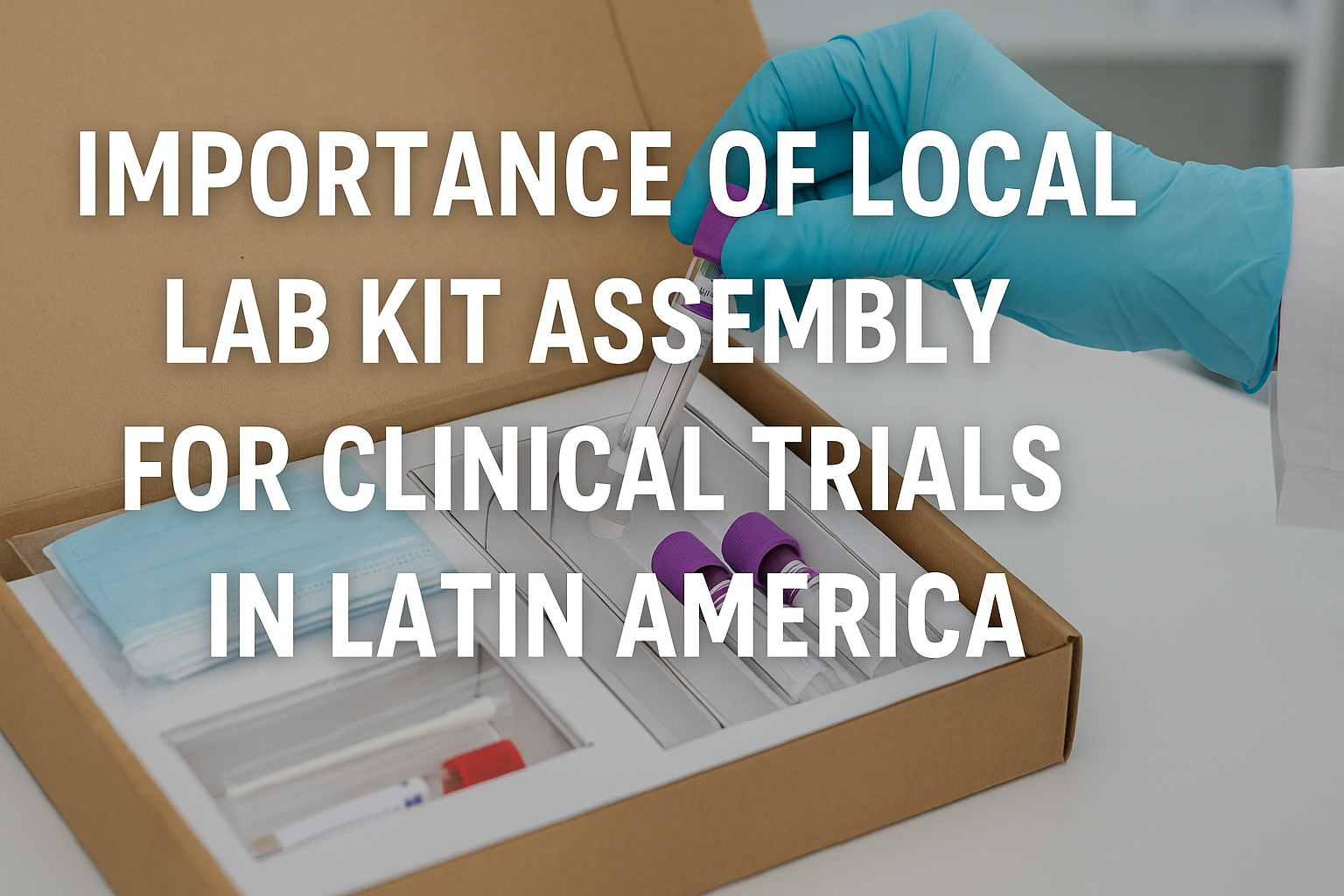What Are the Benefits of Local Lab Kit Assembly in Latin America?

Conducting clinical trials in Latin America presents unique opportunities and challenges. One critical aspect is the assembly of lab kits, which are essential for collecting and processing biological samples. Traditionally, these kits have been assembled in regions like the U.S. or Europe and then shipped to Latin American countries. However, this approach often leads to logistical complexities, increased costs, extended timelines, and delays. Establishing local lab kit assembly within Latin America offers significant advantages, including time and cost savings, streamlined logistics, and enhanced scalability.
Cost Savings
Importing lab kits from outside Latin America is a burden that incurs substantial expenses. These include direct costs like shipping and handling, as well as indirect costs such as customs duties, taxes, and regulatory compliance fees. For instance, in Argentina, importing equipment often requires specific certifications and compliance with various agencies, adding to the financial burden. What’s more, conducting clinical trials in Latin America can be up to 30% more cost-effective than in North America or Europe, partly due to lower operational expenses. By sourcing materials and assembling kits within the region, sponsors can achieve more predictable and manageable budgets. Local assembly can also significantly reduce or eliminate indirect costs, reallocating resources to other critical aspects of a trial.
Time Efficiency
Time is a critical factor in clinical trials. Importing lab kits from outside Latin America can result in unpredictable delays due to customs procedures and shipping logistics. For example, test kits and controls are often held in customs for extended periods, reducing their shelf life upon arrival and potentially causing work stoppages due to expired materials. In Brazil, even with all proper paperwork in place, customs can be slow, causing significant delivery delays. Local assembly circumvents these hurdles and minimizes delays. This ensures that clinical trials adhere to timelines, accelerate the trial process, and reduce the risk of interruptions.
Simplified Logistics
Shipping lab kits internationally involves complex logistics, including compliance with diverse regulations, extensive documentation, and coordination with multiple agencies. Coordinating international shipments involves multiple stakeholders, increasing the risk of miscommunication and errors. For example, Argentina imposes stringent regulations on various items, requiring specific certifications and approvals. Local assembly circumvents these challenges and streamlines the supply chain, reducing touchpoints and minimizing potential disruptions. Local vendors are more familiar with regional regulatory requirements, ensuring smoother transactions and fewer delays.
Improved Quality Control and Compliance
Proximity to the assembly process allows for better oversight of quality control processes, ensuring that kits meet specific trial requirements and regulatory standards. Local suppliers understand the specific needs and standards of the Latin American market, ensuring that lab kits meet required specifications. It also reduces the risk of delays associated with obtaining export/import permits and material transfer agreements, which are often required when shipping samples internationally. This close collaboration enhances compliance with local regulations and standards. As a result, trials can proceed more smoothly and with greater assurance of data integrity.
Enhanced Scalability and Flexibility
Latin America’s diverse geography requires an adaptable approach to clinical trial logistics. Local infrastructure and experienced in-country staff provide flexibility to scale operations across multiple regions. Centralized coordination ensures consistency and reduces administrative burdens, facilitating smoother trial execution. This scalability is vital for sponsors aiming to expand their research footprint in Latin America.
Boost Patient Engagement and Retention
Localized approaches, such as home visits facilitated by nearby kit assembly, enhance patient convenience and compliance. In many Latin American countries, participation in clinical trials is seen as a valuable opportunity to access healthcare services that might otherwise be unavailable, boosting retention rates.
Environmental Considerations
Reducing the need for international shipping by assembling kits locally also has environmental benefits. International shipping contributes significantly to carbon emissions, particularly when air freight is used. By sourcing and assembling kits within Latin America, the carbon footprint associated with clinical trials is reduced, contributing to more sustainable research practices.
The H Clinical View
Transitioning to local lab kit assembly in Latin America offers numerous advantages for clinical trials, including enhanced time and cost efficiency, simplified logistics, improved scalability, and better compliance with local regulations. Leveraging local infrastructure and experienced personnel not only streamline trial operations but also contribute to the overall success and sustainability of clinical research in the region. H Clinical believes that with local lab kit assembly, sponsors can navigate the region’s complexities more effectively, ensuring effective and efficient trial execution.
Sources
- Fitzgibbon JE, Wallis CL. Laboratory challenges conducting international clinical research in resource-limited settings. J Acquir Immune Defic Syndr. 2014 Jan 1;65 Suppl 1(0 1):S36-9. doi: 10.1097/QAI.0000000000000038. PMID: 24321984; PMCID: PMC3893068. Available at: https://pmc.ncbi.nlm.nih.gov/articles/PMC3893068/
- Patel, R. and Bamberger, J. “Overcoming Complexities of Clinical Trial Supplies in Latin America.” Applied Clinical Trials, 2017. Available at: https://www.appliedclinicaltrialsonline.com/view/overcoming-complexities-clinical-trial-supplies-latin-america
- Fernandes, P. “Latin America: A Promising Destination for High-Quality Clinical Trials.” Blog post from August 24, 2024. Available at: https://www.paulocfernandes.com/en/post/latin-america-a-promising-destination-for-high-quality-clinical-trials
About the Author – Mitchell Parrish
Mitchell Parrish is the President and CEO of H Clinical. He is responsible for planning and executing the strategic vision and direction for H Clinical, along with advising the leadership team on operations, business activities, and finances.
LinkedIn: https://www.linkedin.com/in/mitchellparrish/
Follow us on LinkedIn: https://www.linkedin.com/company/h-clinical/
We simplify clinical trials across Latin America.
H Clinical simplifies complex clinical trials to meet the needs of all patients and studies. We are the leader in delivering localized, community-based, patient-centric clinical trial services and home healthcare throughout Latin America. At H Clinical, we’re bringing clinical research home.
Are you ready to simplify clinical trials in Latin America?

We simplify complex clinical trials across Latin America.
H Clinical simplifies complex clinical trials to meet the needs of all patients and studies. We are the leader in delivering localized, community-based, patient-centric clinical trial services and home healthcare throughout Latin America. At H Clinical, we’re bringing clinical research home.
-
TAMPA - U.S./CORPORATE HEADQUATERS
7901 4th St N, Suite 5706 St. Petersburg, FL 33702 -
MEXICO CITY – CENTRAL AMERICAN HEADQUARTERS
Av. Álvaro Obregón 121, Piso 7 Colonia Roma Norte Cuauhtémoc, Ciudad de México, C.P. 06700 -
SAO PAULO – SOUTH AMERICAN HEADQUARTERS
Rua Salviano Jose Da Silva, No 225 Bairro El Dorado, Sao Jose Dos Campos, SP, Brazil


